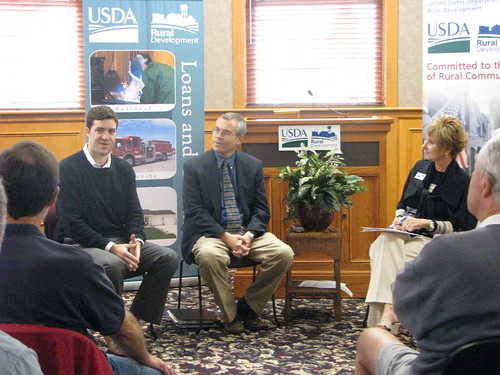
Monmouth, Ill., residents Vicki and Ted Briscoe want to know when their access to the Internet will no longer be hampered by a slow dial up connection. The answer—12 to 18 months—came from Noah Campbell, vice president of community relations for Utopian Wireless Corp, at a talk show-style forum held at the Briscoes’ alma mater Monmouth College Wednesday, Sept. 22.
The forum was held to discuss the new broadband service made possible with Recovery Act funding offered through USDA Rural Development’s Broadband Initiatives Program.
Campbell travelled from Maryland to participate in the forum. Utopian Wireless, based in Maryland, was recently selected for a loan and grant from USDA Rural Development to make high speed Internet available to 4,000 homes, 290 businesses and 100 community institutions in the area.
The company will use WiMAX technology to bring advanced, upgradable wireless broadband communications to the area. It is particularly well suited for economically delivering high speed 4G service to areas like Monmouth where the terrain is relatively flat.
“Without connectivity, we can’t move forward,” said Illinois Rural Development State Director Colleen Callahan, who hosted the meeting. “Broadband is the great equalizer and critical for future of rural communities.” Vicki Briscoe concurred. She is concerned young people won’t stay in rural communities unless we provide the structures, like broadband, that young people expect.
Monmouth College history professor Fred Witzig, co-coordinator of the college’s new Midwest Matters initiative, said students are pleasantly surprised by the opportunities available in smaller communities, especially when they realize they don’t have to leave behind some of the amenities of the city.
Witzig added that broadband is absolutely crucial to rural areas as were the railroads and mail order catalogs of the past. “To survive, regions need to connect to the rest of the world,” he said. “It takes public private coordination to make those connections.”
Callahan concluded the talk show with the admonition that we need to provide the infrastructure necessary to help us move forward and to chart whatever comes next.
